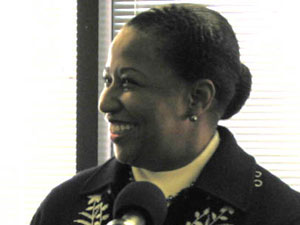Photos
Your Voice
| |||||||||||||||||||||||||||||||||
Braun quits presidential race, backs Dean
January 15, 2004
 |
| Democrat Carol Moseley Braun, in a radio debate in Iowa last week. She dropped out of the presidential race Tuesday, and endorsed Howard Dean. (Photo by John Keator, NPR News) |
Carroll, Iowa — Former Illinois Sen. Carol Moseley Braun dropped out of the presidential race Thursday and endorsed Howard Dean as "a Democrat we can all be proud to support."
"Gov. Dean has the energy to inspire the American people, to break the cocoon of fear that envelopes us and empowers President Bush and his entourage from the extreme right-wing," she said at a joint appearance with the former Vermont governor.
Braun, whose own campaign failed to generate significant campaign funds or support in national or state polls, said Dean had a program to "put our country back on track to tax fairness, job creation, balanced budgets and an economy that works for everyone regardless of sex or race."
Braun, the only woman and one of two African-Americans in the race, left the field four days ahead of the Iowa caucuses. Her departure left eight men vying for the Democratic nomination to challenge President Bush this fall. Another contender, Florida Sen. Bob Graham, folded his campaign last year.
Dean said Wednesday that he welcomed the endorsement of the former senator from Illinois.
"She's a principled person. We just hit it off. I like her a lot," he told reporters. "It's going to be a big help to us."
Dean's campaign manager, Joe Trippi, said before the announcement that Braun approached the former Vermont governor after a recent debate and told him she was considering leaving the race and backing him. Braun is giving Dean her endorsement even as he has faced questions about his record on race issues, including his lack of minority Cabinet members during his five terms as Vermont governor.
Braun came to Dean's defense in a debate last Sunday when Al Sharpton, the other black candidate in the Democratic field, accused the former governor of trivializing race issues. Braun never broke out of single digits in national and state polls and failed to qualify for several state ballots.
And though she had been endorsed by two influential women's groups - the National Organization for Women and the National Women's Political Caucus - that support failed to translate into financial support. Braun struggled to raise money while running up thousands of dollars in debt. She also missed the deadline to file paperwork for the initial round of federal campaign money, delaying for several weeks the receipt of any federal matching funds, expected to amount to several hundred thousand dollars.
Even her own campaign manager, Patricia Ireland, had said publicly that there was no way Braun could win the nomination.
She leaves the race after having little impact on it, except for some bright moments in debates. Braun often stressed during the campaign that she was running for president because it was time to "take the 'Men Only' sign off the White House door."
Rival Joe Lieberman offered words of praise for Braun, but little comment about her endorsement of Dean, calling her "an able and eloquent person, an honorable person. When I'm president of the United States, I'm going to convince Carol Moseley Braun to work in my administration."
Dennis Kucinich said, "I'll miss her," and expressed the hope that she persuades Dean on a single-payer, universal health care policy.
The run for president also may have helped Braun rehabilitate her image. Elected to the Senate in 1992 during the "Year of the Woman," Braun lost the seat after one term due to allegations about her ethics and improper campaign spending.
Braun had also fallen under criticism for meeting in 1996 with Gen. Sani Abacha, the late dictator of Nigeria who had been accused of myriad human rights violations, during a trip to the country for a friend's memorial. She did not tell the State Department in advance, which she later said she regretted not doing.
After losing the seat, President Clinton named her ambassador to New Zealand.
(Copyright 2004 by The Associated Press. All Rights Reserved.)
|
News Headlines
|
Related Subjects
|

